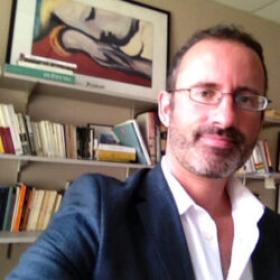A specialist in early modern Hispanic culture, his research interests within the early modern period focus on Hapsburg imperial policy and propaganda, their effects on issues of gender, ethnicity and nation building, and their expression through performance. He is currently working on a study of the symbolic discourse of sexual domination and forced marriage in the Spanish Hapsburg Empire’s encounter with the cultures of its colonized Others. Dr. Marchante-Aragón has published articles in academic journals such as Viator: Medieval and Renaissance Studies, Journal of Early Modern Cultural Studies, Nueva revista de filología hispánica, Hispanófila, and Analecta Malacitana among others. He is the author of the monograph Performing the King Divine: The Early Modern Spanish Aulic Festival (Edition Reichenberger, 2017), and coeditor of Nexos Culturales en el Mundo Hispánico (Malaga University Press, 2023). Dr. Marchante-Aragón is the Secretary of the Association for Hispanic Humanities.
Degrees
Ph. D. Romance Languages University of Pennsylvania
MA Villanova University
Licenciatura Universidad de Cádiz, Spain
MONOGRAPH
Performing the King Divine. The Early Modern Spanish Aulic Festival. Kassel: Editio Reichenberger, 2017.
EDITED VOLUME
(Coed.) Nexos culturales en el mundo hispánico. Málaga: Universidad de Málaga, 2023.
ARTICLES
“Don Quixote’s Ana Félix: The Virile Morisca Maiden and the Crisis of Imperial Masculinity.” Hispanófila CLXXVI, January (2016): 3-18.
“Ana Félix ‘más desdichada en sus sucesos que en su nombre’: (in)justicia e imperio en el tratamiento de los moriscos en Don Quijote II”(“(In)justice and Empire in the Treatment of Moriscos in Don Quijote II.”) Analecta Malacitana XXXVII, 1-2 (2014): 217-235.
“Las genealogías espurias del imperio turco y el Islam en la Silva de varia lección de Pero Mexía y sus posibles efectos en la percepción de los moriscos” (“The Spurious Genealogies of the Turkish Empire and Islam in Pero Mexía’s Silva de Varia Lección and its Possible Effects on the Perception of the Moriscos.”) Nueva Revista de Filología Hispánica LXII, 2
(2014):357-381.
“Conquest, Rape, and Marriage: Forced Miscegenation in the Hapsburg Empire” eHumanista 17
(2011): 161-84.
“Las armas de los bisabuelos: Don Quijote y la recreación caballeresca de los orígenes de la nación.” In Mecedes Juliá, ed. Don Quijote y la narrativa postmoderna. Cadiz: University of Cadiz Press, 2010. 31-47.
“Queering the Nation: Race and Gender in Jerónimo de Cáncer Los Putos.” Ciberletras 24 (2010).
“The King, the Nation, and the Moor: Imperial Spectacle and the Rejection of Hybridity in the Masque of the Expulsion of the Moriscos.” Journal of Early Modern Cultural Studies. 8 (2008): 98-133.
“‘Este es mi cuerpo’: el ritual del rey sacramentado en dos fiestas de Calderón y Bances Candamo.” Bulletin of the Comediantes. 59 (2008): 345-377
“Folclore, erudición y empirismo en la España del siglo XVI: un ejemplo en el Persiles de Cervantes.” IKALA: Revista de Lenguaje y Cultura Volumen 11-17(2007), 97-117.
“Temples of Dynastic Memory in the Seventeenth Century: Valladolid and London.” Viator: Medieval and Renaissance Studies. 36 (2005): 602-624.
“Evolution of Spanish Court Festivals (1461-1700).” In Sánchez Carretero, Cristina, and Jack Santino, eds. Holidays, Ritual, Festival, Celebration, and Public Display. Alcalá de Henares, Madrid: Universidad de Alcalá, 2003. 17-32.
